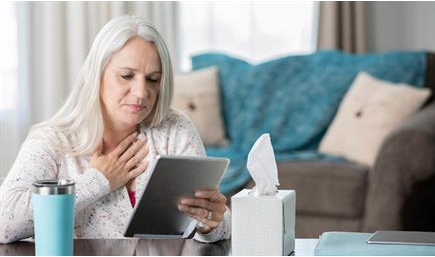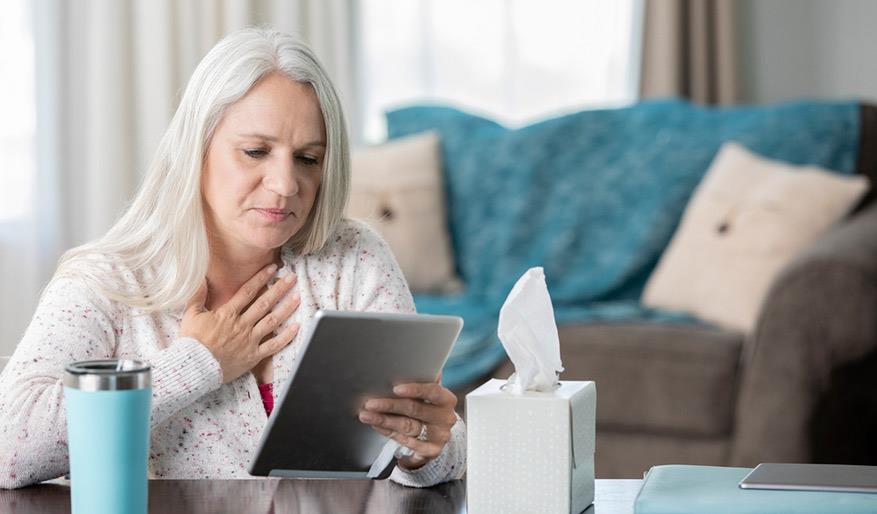Our Doctors
Meet all the doctors from Cleveland Clinic Abu Dhabi.
View Doctors
Don’t neglect other health issues during the coronavirus pandemic

Coronavirus is filling the headlines right now and may well be taking over some of our conversations too. The global pandemic doesn’t appear to be slowing just yet, and we are all adjusting to increased restrictions on our daily movements. But while we try to take onboard new information about COVID-19, its symptoms and how to stay safe, there are some healthcare needs that shouldn’t be ignored.
Managing any existing health conditions is as important as ever. This includes both the body and the mind, as the two work together. By looking after both physical and mental well-being, we maintain optimum health and give our body its best chance at fighting any infection that comes our way.
Managing existing conditions
If you are living with a medical condition or chronic disease, it is important to continue to manage your health as you normally would. For anyone deemed at high-risk of COVID-19 because they live with one of the identified pre-existing conditions, it important you are prepared. With physical distancing in place, popping to the doctors or pharmacy may not be as straightforward as usual.
Continue to take all prescribed medication and make sure you have stocked up on a few weeks supply. If you are running low, check ahead to see if your local pharmacy can deliver prescriptions so you don’t need to go and collect them. Try to make a virtual medical plan if you are in self-isolation. Check with your healthcare provider to see how you can communicate with them – they may offer a dedicated telephone number or provide virtual visits or other online appointments.
If you live alone, it may be a good idea to have a friend or familiar member on speed-dial, so they can be available to drop any necessities or medication round in case you are unwell. Try to ask someone who knows and understand your condition and can help you if you need it.
Don’t neglect mental health
Our mental health may be under a lot of strain right now. Understandably, we may be feeling anxious about the uncertainty of the situation, or a little depressed about the things we are missing from our normal routine. Whether these feeling are new for you, or you have reached out for support before, some of the typical tools and techniques we use to manage our stress might not be available right now.
If you usually manage anxiety and stress through relaxation techniques or exercise, this doesn’t have to stop just because we can’t leave the house. Continue to keep up regular exercise, as the endorphins released will not only boost your mood, but the reduction of stress hormones reduces burden on the immune system. Download online exercise classes or apps and get friends involved to reduce any feelings of isolation
If things are a little harder to handle and you need to talk to someone, search online for facilities offering support. Many healthcare practitioners are offering dedicated helplines. If you have regular therapy appointments, continue to take them; ask your usual facility if they are offering appointments via telephone or online. If you need medication to manage your mental health, make sure you have an adequate supply and continue to take it as required.
Other concerning symptoms
We should now all be aware of the symptoms of COVID-19; fever, tiredness, dry cough and difficulty breathing. But if you develop any other symptoms, caused by something else entirely, they shouldn’t be ignored.
Anything that is affecting your health or causing concern should be reviewed by a medical professional, just as it would at any other time. Your movements may be restricted, but many healthcare facilities are offering alternatives. Schedule an online or telemedicine appointment and talk to a doctor. Don’t feel that because it isn’t COVID-19-related, it isn’t important. Not only will you receive advice and treatment sooner, it will stop it playing on your mind and causing added stress.
If you ever have chest pain, shortness of breath, dizziness, a severe headache or other potentially life-threatening problems, go to the nearest emergency department, or call 999.
Remember, we all need to do what we can to stop the spread of COVID-19 and follow the advice from local governments on physical distancing. But don’t neglect other health concerns. Prioritise anything that is affecting your health or is on your mind, and seek advice as soon as you can.